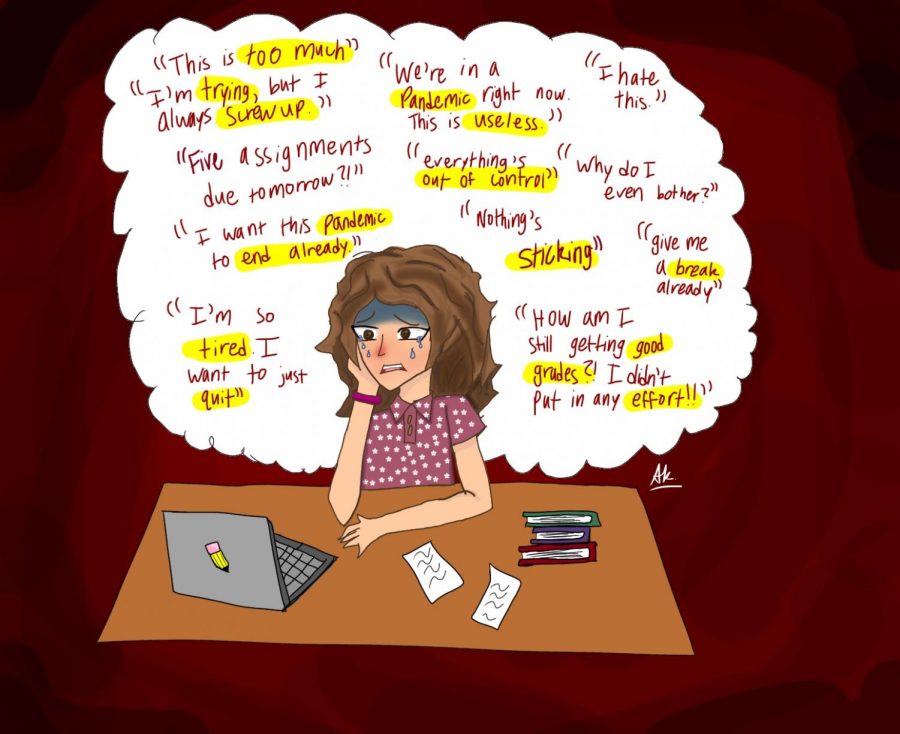Neurodiversity and Online School: An Unsual Pair
This is an image I created to display the effects of neurodivergent stress
School has been really weird for all kinds of students ever since the COVID-19 pandemic hit. In the middle of March of 2020, schools had to finish off the year by switching to online learning, in order to prevent students from getting the Coronavirus. Now with the 2020-2021 school year, schools have either been going 100% on campus, 100% online, or a hybrid as an alternative. While it is great that students are still able to go to school at certain capacities, online school, in particular, has been challenging for students, especially for neurodivergent students.
The term “neurodivergent” or “neurodiversity” refers to variations of the human brain regarding sociability, comprehension, attentiveness, mood, and other brain functions. To put it simply, if someone is neurodivergent, their brain works differently than those who are neurotypical, people who have what is considered normal for the human brain. There are many neurological conditions that fall under the neurodivergent category. The most well-known are ADHD, autism, dyslexia, and etc.
The COVID-19 pandemic has affected people in many ways, but for neurodiverse people, in particular, it has been challenging. It is common for those who are neurodivergent to experience high levels of stress and anxiety, and the pandemic has made it harder for neurodivergent people to keep up with the sudden changes. Especially now that most schools in the United States have switched to online learning, neurodivergent students have been finding online school more difficult than the normal classroom.
“I have autism and ADHD so I go between being hyper-focused and then not being able to concentrate at all very easily,” Ben Levitt, a computer graphics major, said, “For online classes, there is so much going on at once. You have whatever is going on on your computer and then you have whatever is going on in your house […] At school it was just easier separating things.”
Not only can online school be tough for those who can get easily distracted, but online school can cause neurodiverse students to experience burnout. Even though burnout is not exclusive to neurodivergent people, neurodiverse people experience burnout on a different level than neurotypicals. For example, if a kid with ADHD experiences burnout, they would often feel very stressed, anxious, exhausted, and sometimes, a lack of self-worth. Additionally, burnout can cause neurodiverse students to lose motivation to continue on with their school work due to the frustration that comes with it. However, not all neurodivergent students find online school challenging or stressful, as there are some who find online classes easy to manage, as it gives them the opportunity to maintain their routine or be flexible with it.
“I kind of like it online because I can take my time,” Laurie Gallagher, a college student with Down Syndrome, said, “I have more control with time management.”
According to Dr. Lawrence Fung, neurodiverse people, if possible, should be able to keep a routine that can be easily sustained to help adjust to the changes and challenges that face them. He also encourages neurodiverse people to develop new interests and hobbies, along with seeking support for their mental health. Having external support is important, especially from teachers. Cady Stanton, a coach for people who are autistic or have ADHD, has said that teachers should respect their neurodivergent students by not minimizing their feelings and ask them how they can help with their struggles.
It is not easy being neurodivergent, especially during a very stress inducing time like the pandemic stacked on top of school, which is already stressful enough. While it is important to recognize that things are tough, but it is also important to persevere and maintain a structure in your daily life, one that you can easily manage. Additionally, build a support system with people who you can trust, whether that be your friends, family members, or even your teachers.









